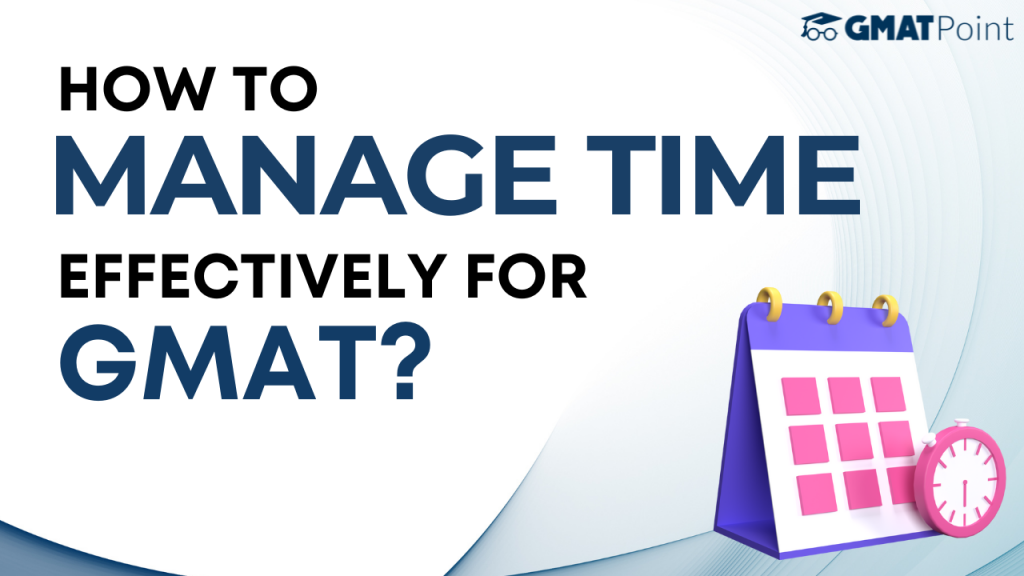The GMAT is a challenging exam that requires both strong analytical and time management skills. To succeed on the GMAT, you need to be able to pace yourself effectively and make sure that you have enough time to answer all of the questions.
Take Free GMAT 2023 Daily Targets
Subscribe To GMAT Preparation Channel
GMAT is a computer-adaptive test, which means that your response to the first few questions will decide the level of questions you get next. If you answer the first few questions correctly, you will get harder questions that carry more weight. Hence, the quicker you solve, the easier questions, and the more time you have for the difficult question.
The other reason why time is extremely important is that you must finish the sections on time. Your scores jump a lot if you finish the last few questions, which are usually the hardest. If you don’t get enough time to answer the last few questions, then you will have a significantly lower score.
Tip & Tricks
Both the Quantitative and Verbal sections of the GMAT are designed to test your ability to make informed decisions quickly. When encountering challenging questions, use the “Process of Elimination” method. Start by ruling out obviously incorrect answers to narrow down your choices and increase the probability of selecting the correct one. This technique prevents you from wasting time on fruitless attempts and helps you move on to other questions efficiently.
Not all GMAT questions carry the same weight in terms of difficulty and points. Focus on answering easier questions correctly and quickly, as these contribute significantly to your overall score. Reserve more time for challenging questions that you are more likely to get right. Remember, the GMAT uses an adaptive scoring algorithm, and answering consecutive questions correctly increases the difficulty level and potential point gain.
Quantitative Reasoning
| Questions | Time (min) |
| 4 | 56 |
| 8 | 48 |
| 12 | 40 |
| 16 | 32 |
| 20 | 24 |
| 24 | 16 |
| 28 | 8 |
| 32 | 0 |
The above table shows how many questions you need to attempt vs the amount of time remaining after you attempt that many questions. For example, after attempting the first four questions, you should have 56 minutes left for the section or more.
Since the questions in the beginning, are much easier, they should require less time to solve than the ones at the end, which are much more difficult.
There are 31 questions in QR. However, the table shows 32 to account for irregularities.
This table should serve as a yardstick on when to guess the answer to the question and jump to the next question if you feel stuck. If you have less time than the one in the right column, it would be better to guess randomly and move on to the next question.
Verbal Reasoning
| Questions | Time(min) |
| 6 | 55 |
| 12 | 44 |
| 18 | 33 |
| 24 | 22 |
| 30 | 11 |
| 36 | 0 |
Similar to the quantitative reasoning section, you can refer to this table to pace your attempt properly and estimate when you should guess and move on to the next question.
Time management is a critical skill to master for success on the GMAT. By understanding the exam’s format, taking timed practice tests, using the “Process of Elimination,” implementing a time allocation strategy, prioritizing questions, practising mental math, and staying calm under pressure, you can optimize your performance and achieve your target GMAT score. Remember, consistent practice and a disciplined approach will ultimately lead to improved time management and greater confidence on test day. Best of luck on your GMAT journey!
Also, Read the following:
- Latest Update On GMAT Focus Edition (Changes In Format)
- GMAT Focus Edition | What We Know So Far
- GMAT 2023 Syllabus Download PDF | GMAT Quant, IR, AWA & Verbal Syllabus In Detail
- Everything about ISB Admissions
- GMAT Score vs Percentile | GMAT Percentile Ranking
- What Is GMAT? – Everything to know about the test
- How To Prepare For GMAT In 1 Month?
- What Is Tested In GMAT Verbal? How To Improve Verbal In GMAT?
- Introduction To GMAT Verbal Reasoning (With Solved Examples)
- How To Improve In GMAT Sentence Correction: Tips, Tricks, and Strategies
- 6 Interesting Facts About The GMAT Exam You Should Know
- GMAT preparation for beginners: What to Study and How
- 6 Best Practices for GMAT Preparation: The Ultimate Study Guide
If you are starting your GMAT preparation from scratch, you should definitely check out the GMATPOINT
